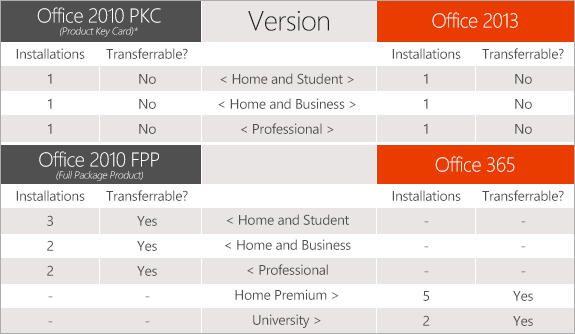Last week a number of sites including TechSpot reported on an apparently new licensing restriction for the retail version of Office 2013 that essentially ties your version of the software to a single computer -- not one at a time, but only one PC, forever. If the computer crashes you can reinstall Office, but if dies or you simply upgrade to a new machine you can’t transfer the license, even after uninstalling the suite from the old one.
There's been a lot of discussion about Microsoft using these ‘tactics’ to push its Office 365 subscription package, which allows installations on five machines plus select mobile devices for $99 a year. There’s certainly some truth to that but the company is now hoping to bring some clarity regarding licensing in Office 2013.

In a blog post published yesterday, Office marketing manager Jevon Fark explains that Office 2013 actually features the same licensing rights as the Product Key Card (PKC) version of Office 2010. The latter refers to versions of Office that come preloaded with new PC purchases and require users to buy a product key to activate. According to Fark, this version was chosen by a majority of Office 2010 customers worldwide -- no doubt because it was cheaper and easier considering the software was already installed on the machine.
The problem is with Office 2013 you no longer have the option to choose between PKC or FPP (Full Package Product) and the only retail version available has been demoted to OEM status, which seems overly restrictive considering the price. If you spend $400 on the Professional edition Microsoft expects you to buy another license when upgrading your PC. Even for the basic Home & Student edition at $140 that seems unreasonable.
You'll pay more for the same
One last detail Microsoft omitted is that even though the licensing terms for Office 2013 and Office 2010 PKC match, pricing does not. We’ve added the table below to illustrate the difference but you’re basically paying $20 to $50 more for the equivalent versions of the updated suite. The price hike is in line with a recent update to the Office for Mac 2011 pricing and the end of multi-license packs for that platform.
| Office 2010 FPP | Office 2010 PKC | Office 2013 | |
| Professional Academic | $99 | -- | -- |
| Home & Student | $149 | $119 | $139.99 |
| Home & Business | $279 | $199 | $219.99 |
| Professional | $499 | $349 | $399.99 |
It's worth noting that Microsoft still hasn't clarified how and if it will enforce the non-transferability policy on Office 2013. Also, for households and small businesses that need to run Office on multiple computers, at $99 per year Office 365 isn’t a bad alternative to the previous FPP version of Office, but some users will undoubtedly will be caught between a restrictive license they don’t want and a recurring subscription they don’t need.